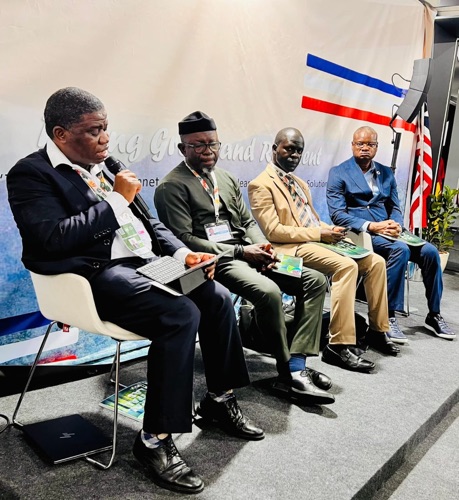Liberia has reaffirmed its commitment to sustainable growth and climate action on the global stage, unveiling a bold, integrated development and climate framework during the opening of its national pavilion at the 30th United Nations Climate Change Conference (COP30) in Belém, Brazil.
Delivering the keynote address, Hon. Dehpue Y. Zuo, Deputy Minister for Economic Management at the Ministry of Finance and Development Planning, outlined Liberia’s transformative agenda for climate-resilient development. Representing Finance Minister Hon. Augustine Kpehe Ngafuan, who remained in Monrovia to submit the national budget, Hon. Zuo said Liberia’s presence at COP30 symbolized “a renewed determination to protect the planet and make sustainability the common language of prosperity.”
ARREST Agenda: Liberia’s Path to Sustainable Transformation
Deputy Minister Zuo announced that under President Joseph Nyuma Boakai, Sr., Liberia has entered a new era of “sustainable transformation” guided by the ARREST Agenda for Inclusive Development (AAID) — a US$8.4 billion plan that serves as the country’s blueprint for climate-resilient growth.
ARREST — standing for Agriculture, Roads, Rule of Law, Education, Sanitation, and Tourism — links Liberia’s economic recovery directly to environmental stewardship.
“The road to development is the development of roads,” Minister Zuo emphasized, describing the government’s push for climate-resilient infrastructure that connects markets and communities while protecting the environment.
He detailed efforts to modernize agriculture through climate-smart farming polish, expand renewable energy, promote waste-to-energy systems, and build a thriving eco-tourism industry that turns Liberia’s natural beauty into a driver of inclusive prosperity.
NDC 3.0: Ambition Meets Action
Hon. Zuo also unveiled Liberia’s Third Nationally Determined Contribution (NDC 3.0), which commits the country to reduce greenhouse gas emissions by 64% by 2035 and achieve net-zero emissions by 2050.
The updated NDC, aligned with the ARREST Agenda, focuses on forest protection, renewable energy, and climate adaptation — particularly in agriculture and coastal resilience. Implementing these commitments will require an estimated US$490 million through 2025, Zuo said, adding that Liberia’s vulnerability score of 55.1 on the Climate Finance Vulnerability Index underscores the urgency of international support.
“Without scaled action, our economy could shrink by 15% by 2050, pushing 1.3 million Liberians into poverty,” he warned.
Innovating with the Atlas of Natural Capital
Highlighting a groundbreaking tool for sustainable planning, Hon. Zuo presented Liberia’s Atlas of Natural Capital, developed by the Environmental Protection Agency (EPA) with UNDP and partners. The Atlas provides data-driven mapping of Liberia’s forests, minerals, water, and biodiversity — enabling policymakers to value and protect natural resources.
“The Atlas helps Liberia know, value, and protect its wealth,” Hon. Zuo said. “It is both a scientific tool and a moral compass for sustainable finance.”
Global Appeal for Climate Justice
Calling attention to the widening climate finance gap, Deputy Minister Zuo urged developed nations and global institutions to honor their commitments to vulnerable countries. Citing findings from the Independent High-Level Expert Group on Climate Finance, he noted that climate finance must rise to $2.4 trillion annually by 2030 and $3.3 trillion by 2035 to meet global needs — yet the least developed countries face the greatest burden.
“Our forests store carbon that benefits the world, yet the communities who protect them remain among the poorest,” he said. “We call for fair and accessible climate finance through national systems, investments in nature-based solutions, and renewed commitment to loss and damage funding.”
Partnership for the Planet
Hon. Zuo expressed appreciation to partners including UNDP, the World Bank, the African Development Bank, IMF, the European Union, and Liberia’s bilateral allies for their continued support in strengthening the country’s climate finance ecosystem.
Hon. Zuo declared that Liberia’s climate and development agenda was not just a national plan, but “a contribution to humanity’s collective survival.”
“With the ARREST Agenda as our compass, NDC 3.0 as our climate commitment, and the Atlas of Natural Capital as our guide, Liberia stands ready — ready to protect, to partner, and to progress,” he affirmed.
“Let history remember COP30 as the moment the world chose a sustainable future.”



